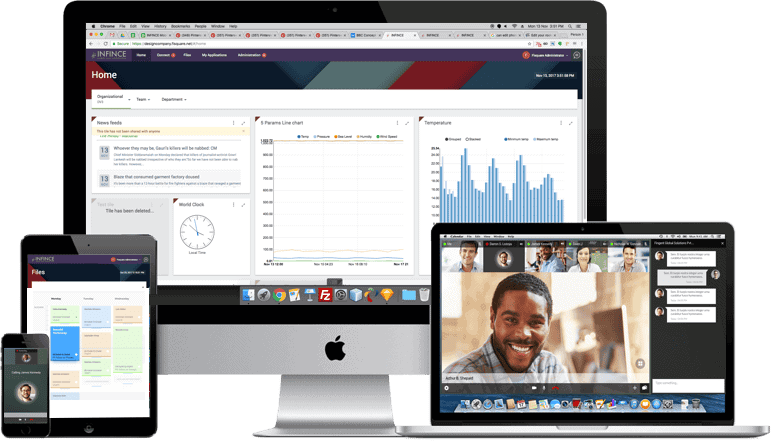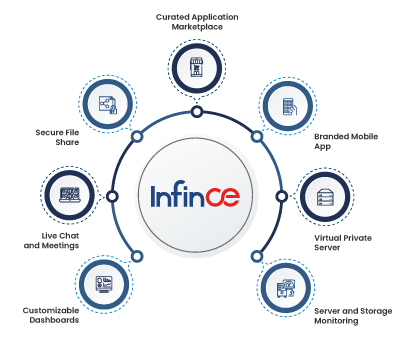The COVID-19 outbreak caused a variety of instabilities across the globe, especially for businesses. Enterprises rushed to think of alternative options to ensure their survival. This led to the rise in the adoption of various forms of technology in every industry. Shifting to the enterprise cloud platform emerged as one such effective solution, which allowed businesses to ensure the smooth running of their operations.
Businesses that struggled to operate due to high operational costs, variations in the supply chain, and fluctuations in logistics after the pandemic are now able to function smoothly with the help of cloud-based architecture. Yet again, while there are myriads of benefits to adopting an enterprise cloud platform, choosing the right one is not that simple. Firstly, you need to ensure that the cloud solution you choose is the perfect fit for your company by evaluating its cost, security, flexibility, and application complexity management.
Read more: Choosing the Right Digital Workplace Software for Your Company
Different types of Enterprise Cloud Solutions
While thinking about an enterprise cloud platform, it is worth noting that there are three different types to choose from – public, private, and hybrid. Each of them varies in its capacities, strengths, and features. Here is a quick look at how the cloud platforms differ from one another.
Private Cloud
As the name indicates, private cloud infrastructure is designed for a single organization. All its components like software and hardware resources are owned and managed by the business. Some well-established organizations even develop their own cloud architecture, while others hire reputed cloud service providers to administer the cloud infrastructure and its resources for them. In either case, the entire cloud platform is exclusively used by a single entity.
Public Cloud
Unlike the private cloud, public cloud platforms allow multiple subscribers to use their resources, and it can be any number of users depending upon the cloud service provider. In the public cloud architecture, the third-party provider manages the infrastructure and its computing services, which are accessed by organizations on-demand over the internet.
Hybrid Cloud
A hybrid cloud model combines both private and public cloud services to give you the best of both worlds. This allows businesses to manage confidential business data on the private cloud while deploying less sensitive applications and workloads on the public cloud. Moreover, the workloads can be moved between cloud solutions as per the needs of the business.
Read more: Why Should Modern Enterprises Rely on Private Cloud Platforms?
Devising the right strategy to choose a Cloud Infrastructure
If you do not make the right choice about the type of cloud solution for your business, it could incur more costs when managing it. Therefore, you should do a proper case study of your business requirements to see which enterprise cloud platform caters to your demands aptly. Some quick points to consider while developing an enterprise cloud strategy.
Control
If you are going to assign the workloads across your organization over the business cloud platform, you need to ensure that you have complete control of the dashboard. At the same time, if you are not fond of managing the cloud resources and the infrastructure and do not have an in-house IT team for that either, then going for managed cloud services would be the better choice.
Workload
Hybrid cloud gives you more flexibility in terms of dividing the workloads between the private and public cloud. Simultaneously, you can also scale the resources and shift between platforms when the costs fluctuate. This means having a well-planned strategy to ensure effective management of the cloud resources when the need arises.
Security
Ensuring optimal data security is crucial for every business, especially for those that deal with confidential customer and client data like payment records and financial details. That is why it is essential to do a thorough assessment of the compliance and security policies of the cloud before adopting the solution for your organization.
Operational Costs
If you are a small-scale business starting to use an enterprise cloud platform for the first time, then it might be quite challenging to determine which one would be a cost-effective solution for you. Yet again, it is important to consider the operational costs of the cloud platform and ensure that you can bear that without any hassles.
Application Complexity
Each type of cloud solution has varying degrees of complexities around handling the IT infrastructure. Therefore, you should evaluate how to integrate the cloud solution into your existing processes to ensure effective deployment. Likewise, you should also consider whether you would be using it for legacy applications or server-less workloads to devise the right strategy.
Flexibility
Being a business owner, you cannot always expect the same amount of customer responses every day. It may be relatively low on some days, while it may turn unbelievably high on other days. So your cloud environment also needs to have the flexibility to respond to these variations. This is another reason why hybrid enterprise cloud platforms are growing in popularity these days.
Read more: What is Hybrid Cloud Identity and Why It Matters for Your Business
Why is it essential for enterprises to move to the Cloud?
Enterprise Cloud Platform is not a new concept; it was introduced in 2006 with the launch of Amazon Web Services (AWS) as the first-ever enterprise cloud storage service. However, over the last decade, the enterprise cloud has rapidly become an innovative solution for businesses that look to future-proof their operations and drive efficiency. Within the short span of about 15 years, the enterprise cloud grew to be an essential asset for all kinds of businesses, with security and flexibility being the main driving forces for its adoption.
In today’s business environment, where every piece of information is stored in digital format and shared among concerned parties via digital channels, data security is a concern for all. Being exposed to cyberattacks would certainly damage the reputation of the business, not to mention the financial losses it can create. This is where enterprise cloud platforms like Infince can help with their robust security features and allow organizations to bolster data security.
In addition to providing specific tools to monitor and ensure high-end security, enterprise cloud also allows organizations to have a reliable disaster recovery plan. So even if adversity strikes, be it a service outage or a natural disaster, you can rest assured of getting things back on track quickly when all the essential data and services are managed on the cloud. Meanwhile, migrating to the enterprise cloud platform will also pave the way for innovation and trying new things at minimal expenditure.
The success, efficiency, and end result of adopting an enterprise cloud service invariably depend on many factors. Yet, the scenarios mentioned above and points would help you to formulate a practical strategy and make an informed decision for your business. So, to make the next move for your business, talk to our experts today!


































